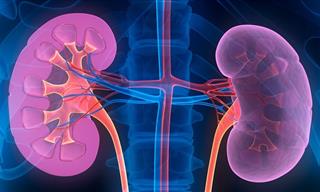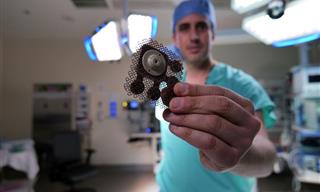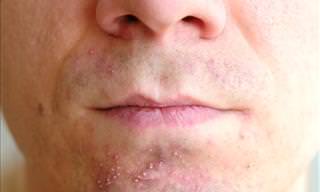1. Folliculitis
Folliculitis is a common skin issue in both men and women year-round, but it becomes increasingly more widespread in the summertime when the body sweats more. But what is folliculitis? Every hair strand on the human body grows from an opening in the skin. This is called a hair follicle. When these follicles become inflamed, larger red bumps or little white pimples form in the hair follicles around the hairs - a condition referred to as folliculitis by dermatologists.
Anyone can develop folliculitis anywhere on their body, including the face and the scalp. The condition can occur when you have ingrown hairs, after shaving, when you’re wearing tight clothing, go to a chlorinated pool or hot tub, or when you’re just sweating more. The skin rash that occurs as a result of folliculitis can be painful, tender, burning, and itchy.
How to prevent folliculitis:
- When you exercise, change out of your workout clothes immediately after a workout and take a shower.
Opt for light, loose-fitting clothing in the summer.
- For men with razor bumps (pseudofolliculitis), growing a beard may be a good option if you don't need a clean-shaven face.
- Avoid shaving, if possible. If you get razor bumps after shaving, consider growing out the hair, or opt for a different hair removal method.
- Shave carefully and less frequently. To reduce the likelihood of getting folliculitis due to shaving, disinfect your razor with alcohol before use, wash your skin before and after shaving, and apply a moisturizer after shaving. Certain products, such as those that contain a lot of alcohol and fragrance can contribute to the development of folliculitis, so make sure to use mild, fragrance-free shaving creams and moisturizers.
- Try and avoid chlorinated hot tubs and pools if you notice that you develop folliculitis.
How to treat folliculitis at home:
If you’re experiencing mild folliculitis, you can successfully treat it at home. To do so, mix ½ teaspoon salt in 1 cup of warm water, dip a washcloth into the solution, and press the cloth onto the affected area for a few minutes a few times a day. This will relieve any swelling, redness, and it will help drain the area. Folliculitis is caused by either bacteria or fungi, so you can also apply OTC antibiotic creams or hydrocortisone cream to promote the healing process.
Finally, don’t forget to wash and moisturize your face twice a day as your skin is healing to reduce the likelihood of spreading the infection and impairing the skin’s barrier function. Seek professional help if your symptoms don’t improve after a few days or worsen.
2. Melasma
Melasma is another common skin condition that worsens during the summer. The term refers to a type of hyperpigmentation in the form of brown or grey spots that appear on the face and neck. Unlike post-inflammatory hyperpigmentation - tiny scars and marks on the skin after acne and pimples - melasma is caused by sun exposure, hormonal changes, or genetics.
All of these factors drive the skin to produce excess melanin, which appears in the form of these spots. Melasma is often triggered in women during pregnancy, in which case it’s sometimes referred to as ‘the mask of pregnancy.’ Although melasma is difficult to get rid of completely, especially without prescription creams and laser treatments, you can prevent it from getting darker and more prominent by wearing sunscreen daily.
Melasma does tend to flare up in the summer due to UV exposure, so it’s key to protect your face and neck from the sun, especially in the summer months. Sun hats and protective clothing can be a great supplement to sunscreen in that regard.
3. Frizzy hair
People with curly or wavy hair often dread the summer because their hair tends to become extra poofy, frizzy, and unmanageable all of the sudden. Frizz occurs when the hair is damaged by the sun and exposed to humid air. Hair in this state is difficult to manage and style, and you may notice a halo of tiny flyaway hairs that are quite tough to get rid of.
Applying a hair oil, using hairspray and a comb to smooth the hair, or pulling it back into a bun or ponytail can all help tame the frizz. But these are all but temporary solutions. To get rid of frizz for good, you must understand that frizz is a symptom of dry hair. And to address the problem, it’s necessary to treat the cause.
To do so, use a more hydrating shampoo and deep conditioning masks occasionally. You could also try washing your hair a bit less frequently, but this isn’t a good idea if you have an oily scalp.
4. Cracked heels
Dry or cracked heels are yet another uncomfortable issue that plagues us as we start wearing open shoes. In many cases, the condition is caused by skin dryness, but it could also be a symptom of a dermatological condition that requires professional help. Cracked heels are worsened by ill-fitting footwear, open-heeled shoes, and flip-flop shoes, all of which expose the skin to the elements and create unnecessary skin friction.
Opt for a pair of good-fitting sandals with the heels covered to reduce your chances of getting cracked heels. If your feet are prone to getting dry and cracked, follow these tips. It’s best to do this in the evening. First, soak your feet in warm water for 15 minutes, then remove the dead skin with the help of a pumice stone. When you’re done, apply plenty of thick foot cream and put on a pair of clean socks.
Repeat this a few nights in a row, and moisturize your feet regularly to prevent any new flareups. After a few days, you’ll notice that the skin \becoming softer and the cracks going away. Keep in mind that this doesn’t work if your feet are cracked to the point of bleeding. If that is the case, it’s important to see a doctor, as these deep fissures can become infected.
5. Puffy eyes
Anyone suffering from seasonal allergies will know that spring and summertime means waking up with itchy and puffy eyes every morning. When we’re exposed to an allergen, specialized cells in the eyes release histamine in response. Unfortunately, the histamine also makes the eyes red, irritated, and swollen. While having puffy eyes isn’t the end of the world, it’s certainly unpleasant when everyone around you is pointing out that you look tired.
The obvious solution is taking antihistamines, which are present in any over-the-counter allergy medication. But timing is also important. If you wake up with puffy eyes, it’s better to take antihistamines before bed. To combat the puffiness, you can keep a cold spoon in the fridge and press it against the skin or use an eye cream that contains caffeine.
Both the cold and caffeine constrict the blood vessels and will help reduce the swelling. You can also try freezing used tea bags that are both cold and rich in caffeine, and use them as cooling eye compresses in the morning.
6. The hot weather ruins your makeup
It can be super annoying when your mascara starts running and your foundation or concealer starts bunching up or looking oily a mere hour after you apply it. The obvious solution for summer makeup is just wearing less or no makeup when it’s super hot outside and your face is sweating more. But let’s be honest, it’s not a realistic solution for those who are used to wearing makeup regularly.
To make your makeup look good in hot and humid weather, opt for waterproof mascara and eyeliner formulations. When your face gets a bit too shiny, use blotting papers or just an ordinary paper napkin to absorb the oils on the skin, and you’re golden.
7. Acne is more common in the summer
Acne is caused by microbes that live on the skin. These microbes feed on the oils on our skin, and since the skin tends to produce more of those in the summer, you’re also more likely to experience acne, be it on the face or on the body. Sweating and touching your face when you’re outdoors can also contribute to acne.
To prevent breakouts from occurring make sure to wash hats, headbands, and sweaty clothes after every use. When your skin gets sweaty, blot the sweat away with a towel instead of wiping, as the wiping motions can mechanically irritate the skin. To heal acne on the face or body, use a body wash or face cleanser that contains salicylic acid or another type of acid that will gently exfoliate the skin and unclog the pores before they have the chance of becoming inflamed.
8. Sunburn
Even if you’re very diligent with your sunscreen use, sunburns do happen when you’re not careful or tend to miss a hard-to-reach spot. When this does occur, you should treat the symptoms by keeping the affected area moisturized. You can also apply a hydrocortisone cream if the area is really inflamed or itchy. We cover a lot more information on treating a sunburn in our article - The Do’s and Don’ts of Healing a Sunburn.
When you're outdoors, make sure to apply sunscreen on all areas that are not covered by clothing or shoes, including the tops of the feet and the ears. It's also very important to reapply the sunscreen every 2 hours, as sweat and water can break down even waterproof sunscreen over time.
9. Insect Bites
Unfortunately, buzzing insects can easily ruin any outdoor activity in the summer, which is why it's really important to wear insect repellant sprays, it doesn't matter if you're taking a long walk in nature or just having an outdoor barbecue. But what should you do if you get an insect bite? The first and most important thing is to identify the bite, as some bites, such as spider bites and tick bites are definitely more dangerous than others.
The severity of your symptoms will depend on your body too. Your reaction to a mosquito bite or a bee bite may be different from another person's, blame our old friend histamine. This chemical is released in response to any bite, but different people are sensitive to different insect bites. As a result, you may be experiencing little or a lot of itching and swelling.
To ease the symptoms, you can take an OTC allergy medication or a hydrocortisone cream for a few days, but make sure to monitor the bite and see a doctor if you experience severe allergic symptoms, such as difficulty breathing, or if the site of the insect bite appears worse over time.
Share these useful tips and tricks with family and friends!
 Go to BabaMail
Go to BabaMail

































